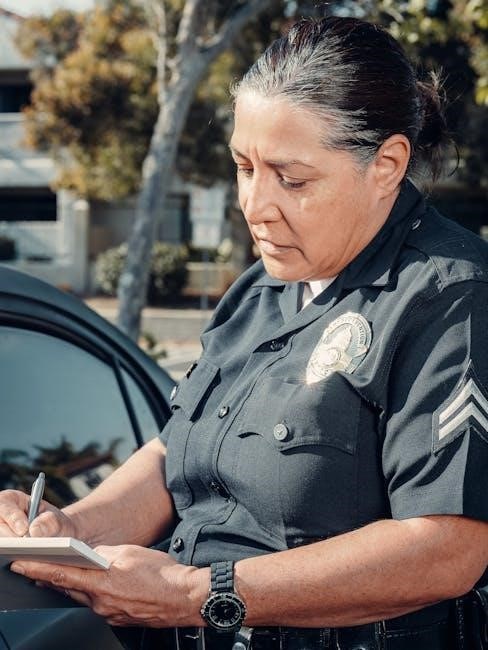
The Law Enforcement Code of Ethics‚ provided by the International Association of Chiefs of Police (IACP)‚ outlines the fundamental principles and standards of conduct for sworn officers. It serves as a foundation for ethical policing‚ emphasizing integrity‚ respect for the law‚ and the protection of communities. This code is a commitment to public service‚ ensuring officers uphold justice and maintain trust with the public they serve.

Purpose and Importance of the Code
The Law Enforcement Code of Ethics is a cornerstone of professional policing‚ designed to establish ethical standards and guide officers in fulfilling their duties responsibly. Its primary purpose is to ensure that law enforcement professionals uphold the principles of justice‚ integrity‚ and respect for human rights. By adhering to the code‚ officers build trust with the communities they serve‚ fostering cooperation and mutual respect. The code also serves as a moral compass‚ helping officers navigate complex situations and make decisions that align with the law and societal expectations. Its importance lies in promoting accountability‚ transparency‚ and fairness in policing. Without the code‚ the integrity of law enforcement could be compromised‚ leading to erosion of public trust. Thus‚ the code is essential for maintaining the legitimacy and effectiveness of law enforcement agencies worldwide.

Key Principles of the Code
The Law Enforcement Code of Ethics emphasizes integrity‚ respect for the law‚ impartiality‚ and accountability. These principles guide officers to uphold justice‚ protect human rights‚ and serve communities with fairness and transparency.
3.1. Integrity in Law Enforcement
Integrity is the cornerstone of the Law Enforcement Code of Ethics‚ requiring officers to act with honesty‚ moral courage‚ and transparency. It demands unwavering adherence to ethical standards‚ ensuring decisions and actions align with the law and public trust. Officers must avoid conflicts of interest‚ refuse bribes‚ and never engage in misconduct. Integrity also mandates accountability for one’s actions‚ fostering a culture where officers take responsibility for their decisions. The International Association of Chiefs of Police (IACP) emphasizes that integrity is non-negotiable‚ as it safeguards public confidence in law enforcement. Without integrity‚ the legitimacy of policing is compromised‚ and the bond between officers and the community is fractured. Thus‚ upholding integrity ensures that law enforcement officers remain true to their oath and commitment to justice‚ maintaining the highest standards of professionalism and ethical conduct.
Respect for the law and human rights is a fundamental principle of the Law Enforcement Code of Ethics. Officers are required to uphold the legal framework and protect the rights of all individuals‚ ensuring equality and justice. This principle mandates that officers act in accordance with constitutional rights‚ international human rights standards‚ and local laws. The Code emphasizes that officers must respect the dignity and rights of every person‚ regardless of race‚ gender‚ religion‚ or social status. This includes avoiding any form of discrimination‚ oppression‚ or intimidation. By adhering to this principle‚ law enforcement officers promote trust and cooperation within the communities they serve. The IACP underscores that respecting the law and human rights is essential to maintaining public confidence and ensuring that justice is served fairly and impartially. This commitment ensures that law enforcement actions are guided by the principles of freedom‚ equality‚ and human dignity‚ fostering a just and peaceful society.
3.3. Impartiality
3.2. Respect for the Law and Human Rights
Respect for the law and human rights is a cornerstone of the Law Enforcement Code of Ethics. Officers are obligated to uphold legal standards and protect the rights of all individuals‚ ensuring fairness and justice. This principle requires adherence to constitutional rights‚ international human rights standards‚ and local laws. The Code emphasizes that officers must respect the dignity and rights of every person‚ regardless of race‚ gender‚ religion‚ or social status. This includes refraining from discrimination‚ oppression‚ or intimidation. By upholding this principle‚ law enforcement officers foster trust and cooperation within the communities they serve. The IACP highlights that respecting the law and human rights is crucial for maintaining public confidence and ensuring impartial justice. This commitment ensures that law enforcement actions align with the principles of freedom‚ equality‚ and human dignity‚ ultimately promoting a just and harmonious society.

Primary Responsibilities of Law Enforcement Officers
The primary responsibilities of law enforcement officers are rooted in serving the community and upholding the law with integrity. Officers are tasked with safeguarding lives and property‚ protecting the innocent from deception‚ and ensuring the peaceful are defended against violence or disorder. They must act as official representatives of government‚ trusted to work within the legal framework. Their duties include enforcing laws impartially‚ maintaining public order‚ and respecting the rights of all individuals. Officers are also responsible for being courageous in the face of danger‚ demonstrating self-restraint‚ and prioritizing the welfare of others. Additionally‚ they must avoid any form of corruption or bribery and disclose such acts when observed. By fulfilling these responsibilities‚ law enforcement officers uphold justice‚ maintain trust‚ and contribute to the well-being of society. Their role is essential in fostering a safe and just environment for all community members.
Administration and Training on the Code of Ethics
The administration and training on the Law Enforcement Code of Ethics are critical to ensuring officers understand and adhere to its principles. The Code is typically administered to all peace officer trainees during their Basic Academy training and to other personnel upon appointment. This ensures that ethical standards are ingrained from the outset of an officer’s career. Training programs often include workshops‚ case studies‚ and scenario-based exercises to reinforce ethical decision-making. Many agencies also provide annual refresher courses to remind officers of their ethical obligations. The International Association of Chiefs of Police (IACP) plays a key role in updating and promoting the Code‚ ensuring it remains relevant to modern policing challenges. Additionally‚ some agencies incorporate the Code into performance evaluations to hold officers accountable for ethical conduct. Effective training not only educates officers but also fosters a culture of integrity within law enforcement organizations‚ ensuring the Code is lived out in daily operations.

Challenges in Upholding the Code
Upholding the Law Enforcement Code of Ethics presents several challenges for officers and agencies. One major challenge is the complexity of modern policing‚ where officers often face high-pressure situations requiring split-second decisions. Public scrutiny‚ amplified by social media‚ can create additional stress and challenge officers’ adherence to ethical standards. Another challenge is the potential for personal biases or prejudices to influence impartiality‚ which can undermine public trust. Corruption within departments and the misuse of authority also pose significant ethical dilemmas. Furthermore‚ resource constraints and workload pressures can sometimes lead to ethical compromises. Ensuring consistent adherence to the Code requires robust training‚ strong leadership‚ and a culture of accountability. Agencies must also address systemic issues‚ such as racial disparities and community distrust‚ to foster an environment where ethical policing thrives. Despite these challenges‚ the Code remains a vital guide for officers to navigate complex situations while maintaining integrity and public trust.
Role of the International Association of Chiefs of Police (IACP)
The International Association of Chiefs of Police (IACP) plays a pivotal role in promoting ethical standards in law enforcement. It is responsible for developing and updating the Law Enforcement Code of Ethics‚ which serves as a foundational document guiding officers’ conduct. The IACP ensures the Code reflects contemporary policing challenges and evolving societal expectations. Additionally‚ the organization provides training programs‚ resources‚ and conferences to help agencies implement the Code effectively. The IACP also advocates for ethical policing practices‚ influencing policy-making and public perception. By fostering collaboration among law enforcement leaders‚ the IACP strengthens the profession’s commitment to integrity‚ transparency‚ and public trust. Its efforts ensure that the Code remains a vital tool for officers navigating complex ethical dilemmas‚ thereby enhancing the legitimacy and effectiveness of policing worldwide.
Real-World Applications of the Code
The Law Enforcement Code of Ethics is applied daily in real-world scenarios‚ guiding officers in ethical decision-making and conduct. It is integrated into training programs‚ ensuring officers understand their duties to serve and protect. The Code is used to address dilemmas such as use of force‚ confidentiality‚ and impartiality. For instance‚ officers rely on its principles to resolve conflicts without bias and to avoid unnecessary force. Additionally‚ the Code is a reference for internal investigations and accountability measures‚ ensuring transparency and trust. Real-world applications include scenario-based training exercises that simulate ethical challenges‚ helping officers apply the Code effectively. By adhering to the Code‚ law enforcement agencies foster public confidence and uphold justice in their communities‚ ensuring ethical policing practices are rooted in daily operations and interactions. This practical implementation underscores the Code’s importance in modern policing.

Legal Implications and Accountability
The Law Enforcement Code of Ethics carries significant legal implications‚ as it establishes standards that officers must adhere to while performing their duties. Violations of the Code can result in disciplinary actions‚ legal consequences‚ and damage to public trust. Accountability measures ensure that officers are held responsible for their actions‚ maintaining the integrity of the justice system. Legal frameworks often incorporate the Code’s principles‚ providing a foundation for ethical conduct and transparency. Officers are required to uphold the law impartially‚ avoiding corruption‚ bribery‚ or any form of misconduct. Mechanisms such as internal investigations and civilian oversight bodies are implemented to address violations and ensure compliance. Additionally‚ legal protections‚ including indemnification and pro bono assistance‚ are available to officers who face unjust legal challenges while acting in good faith. These measures reinforce the Code’s importance in maintaining lawful and ethical policing practices‚ protecting both officers and the communities they serve.
The Law Enforcement Code of Ethics serves as a cornerstone for ethical policing‚ guiding officers to uphold justice‚ integrity‚ and respect for human rights. Its principles ensure that law enforcement professionals act with integrity‚ impartiality‚ and accountability‚ fostering trust between officers and the communities they serve. As policing evolves‚ the Code must adapt to address emerging challenges‚ such as advancements in technology and changing societal expectations. Future efforts should focus on enhancing training programs‚ promoting transparency‚ and fostering collaboration between law enforcement agencies and the public. By adhering to the Code‚ officers can maintain their commitment to ethical conduct‚ ensuring a safer and more just society. Continuous updates and a proactive approach to ethical dilemmas will be essential in shaping the future of policing‚ ensuring the Code remains a vital tool for officers and a symbol of their dedication to public service.

References and Further Reading
For a deeper understanding of the Law Enforcement Code of Ethics‚ several key resources are available. The International Association of Chiefs of Police (IACP) provides the official Law Enforcement Code of Ethics document‚ updated in 2024‚ which outlines the fundamental principles and standards for policing. Additionally‚ the Code of Ethics for Law Enforcement Officers published by Interpol offers global perspectives on ethical conduct. The Los Angeles Police Department also provides a detailed guide on ethical principles and practices. For academic insights‚ works by authors such as AS Kasatkina and EV Emelianova explore the theoretical foundations of ethical policing. The Nebraska Law Enforcement Code of Ethics and the Policing Code of Ethics document from the City of Los Angeles are also valuable resources. These materials can be accessed through official websites‚ academic journals‚ and platforms like Muck Rock and DocumentCloud.